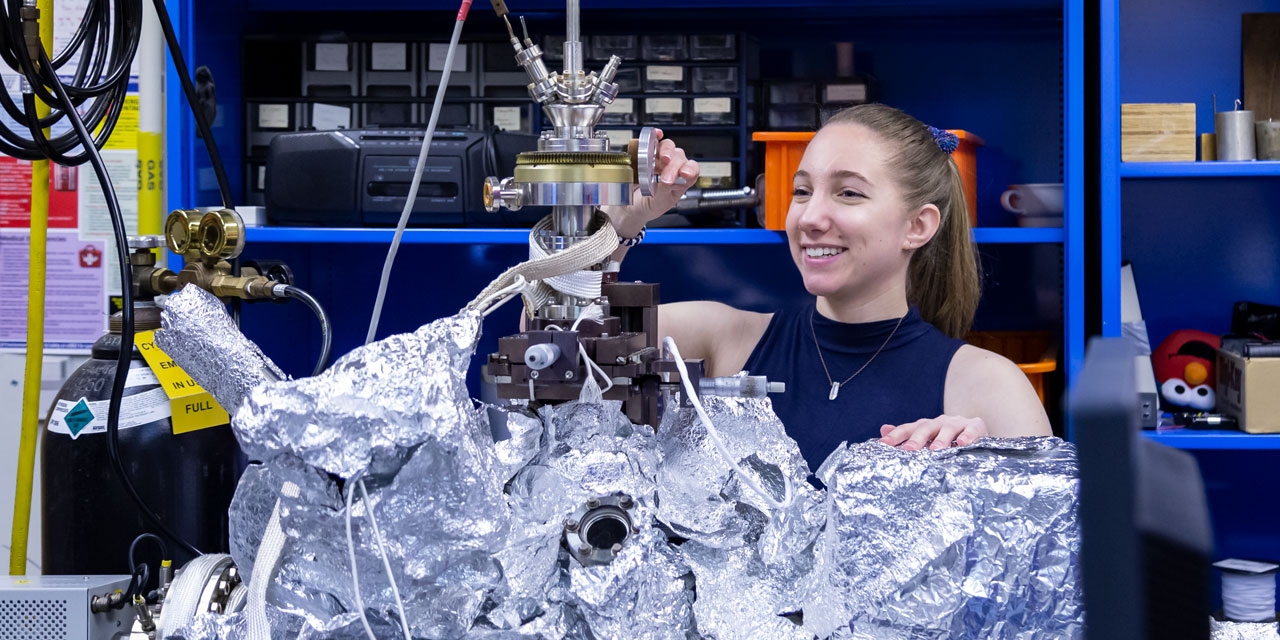Ella Mullikin ’20, 2019 Goldwater Scholarship for Biochemistry and Astrobiology Research

This story was originally published in Wellesley's Daily Shot on May 6, 2019.
Ella Mullikin ’20 has been awarded a 2019 Barry Goldwater Scholarship, which supports undergraduate students of outstanding promise who plan research careers in STEM fields by covering the cost of tuition, fees, books, and room and board up to a maximum of $7,500 per year.
Mullikin is continuing to work toward her career goal of a dual-title PhD in biochemistry and astrobiology, and plans to study membrane structure with attention to abiogenic protocell formation and implications for origins of life.
A chemical physics major, Mullikin discovered her love for science in middle school through Carl Sagan’s Cosmos series. “I previously had dreams to be an author, but found myself called by the combination of logic, mystery, and truth in science,” she said.
Mullikin credits a series of encouraging teachers in high school with cultivating her interest in science. She was involved in a science research club in high school, and in her spare time she conducted low-budget, at-home research projects. A teacher guided her to an internship at a biotechnology center, where she had her first experience with organized science research.
While visiting Wellesley’s campus as a prospective student, Mullikin toured the lab run by Chris Arumainayagam,professor of chemistry, and was struck by the “involvement and enthusiasm of the student lab members” and the lab work’s relevance to her interests. Arumainayagam was later assigned as her first-year mentor.
“The research-related opportunities I have experienced because of Professor Arumainayagam’s lab have definitely been fundamental in securing and shaping my decision to pursue chemical physics, biochemistry in graduate school, and pure science research generally,” Mullikin said.
“One is lucky to encounter students of Ella’s caliber once every decade or so,” said Arumainayagam. “In August 2017, several internationally recognized experts in the field of astrochemistry were present at her talk, which was part of the Molecules in Space: Linking the Interstellar Medium to the (Exo)planets symposium organized by Alexander Tielens, considered by many to be the godfather of astrochemistry. Such an honor is rarely accorded to graduate students, let alone a first-year undergraduate.”
Richard French, Louise Sherwood McDowell and Sarah Frances Whiting Professor of Astrophysics and professor of astronomy, remarked that Mullikin’s strong interest in astrobiology was clear when she took his introductory astronomy course. “This is a very interdisciplinary subject, requiring an understanding of biology, chemistry, physics, and astronomy, and Ella’s broad experience in science is going to be valuable as she pursues her passion for discovery,” he said.
“We’re just delighted for Ella, and I’m thrilled, too, for her professors and mentors,” said Kate Dailinger, director of fellowship programs at Wellesley Career Education. “Goldwater scholarships are the most prestigious undergraduate science awards in the country, and Wellesley students’ strong record with this extremely competitive award says a great deal not only about our students but also about the strength of undergraduate teaching and research in the sciences at Wellesley.”
The mission of the Goldwater Foundation and its scholarship program is to help develop the nation’s next generation of researchers in the natural sciences, mathematics, and engineering by awarding scholarships to sophomore and junior college students who intend to pursue research careers in these fields. The scholarship is awarded on the basis of past and current academic performance and/or research experience and of exceptional promise to pursue an interesting and valuable STEM research career after graduation.



